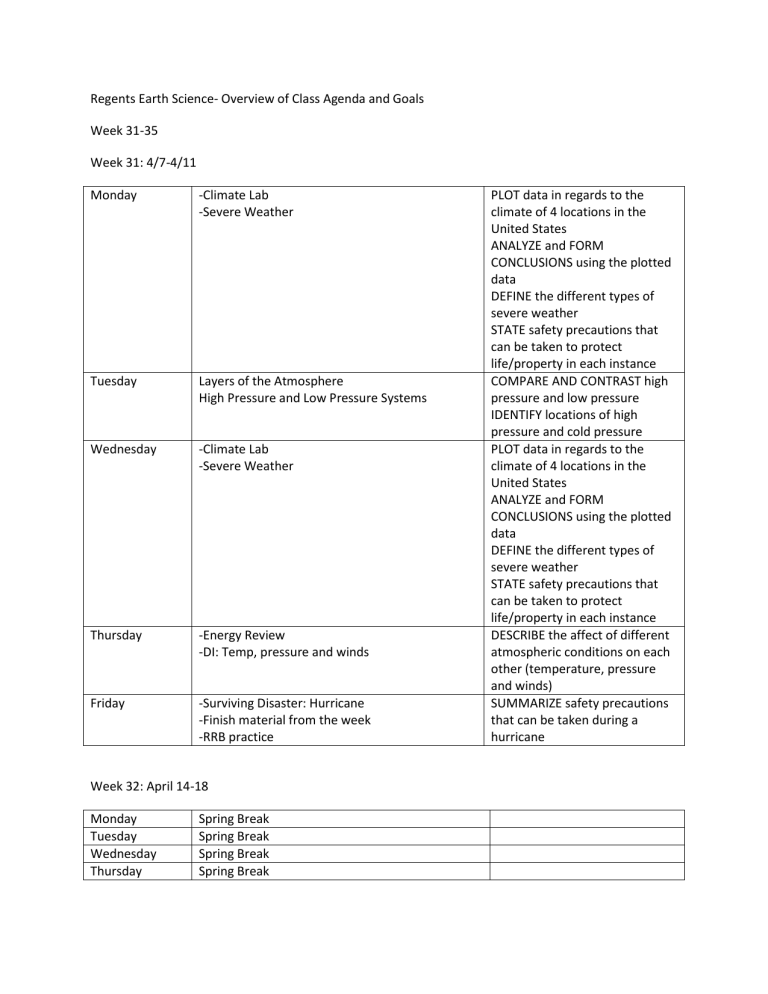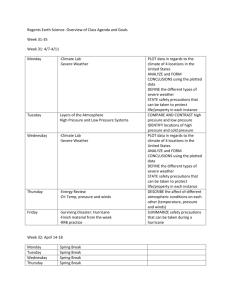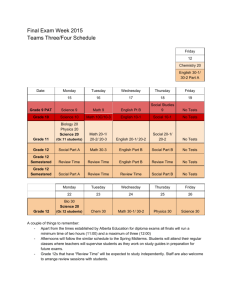Regents Earth Science- Overview of Class Agenda and Goals Week

Regents Earth Science- Overview of Class Agenda and Goals
Week 31-35
Week 31: 4/7-4/11
Monday -Climate Lab
-Severe Weather
Tuesday
Wednesday
Layers of the Atmosphere
High Pressure and Low Pressure Systems
-Climate Lab
-Severe Weather
Thursday -Energy Review
-DI: Temp, pressure and winds
Friday
Week 32: April 14-18
-Surviving Disaster: Hurricane
-Finish material from the week
-RRB practice
Monday
Tuesday
Wednesday
Thursday
Spring Break
Spring Break
Spring Break
Spring Break
PLOT data in regards to the climate of 4 locations in the
United States
ANALYZE and FORM
CONCLUSIONS using the plotted data
DEFINE the different types of severe weather
STATE safety precautions that can be taken to protect life/property in each instance
COMPARE AND CONTRAST high pressure and low pressure
IDENTIFY locations of high pressure and cold pressure
PLOT data in regards to the climate of 4 locations in the
United States
ANALYZE and FORM
CONCLUSIONS using the plotted data
DEFINE the different types of severe weather
STATE safety precautions that can be taken to protect life/property in each instance
DESCRIBE the affect of different atmospheric conditions on each other (temperature, pressure and winds)
SUMMARIZE safety precautions that can be taken during a hurricane
Friday Spring Break
Week 33: April 21-25
Monday
Tuesday
Wednesday
Thursday
Conference Day
Conference Day
-Go over Break HW
-Break HW Quiz
-Severe Weather Article Summary
***CLEAR 2 L Soda Bottles NEEDED for Lab Next
Monday!***
-Complete Cyclonic Weather Lab
COMPARE AND CONTRAST severe weather articles
SUMMARIZE take aways from group article summaries
PLOT hurricane data
FORM CONCLUSIONS based on prior knowledge and patterns
Friday Finish Wind Notes
Go over Weather Lab Discussion Questions
Week 34: April 28-May 2
Monday -Concept Map: Factors Affecting Evaporation
-Notes: Moisture in the atmosphere
Tuesday
Wednesday
Thursday
DI/Practice: Measuring Moisture in the
Atmosphere and in Our Classroom
DO NOW: DP and RH practice
Notes: How do clouds form and Precip Types
Create a Cloud Lab
Notes and Practice: Atmospheric Transparency and Air Masses
LIST the factors that affect the rate of evaporation
DESCRIBE how moisture enters our atmosphere and how it affects the atmosphere
EXPLAIN how moisture is measured in our atmosphere
CALCULATE relative humidity and dewpoint give certain variables
COLLECT DATA in the classroom to determine the relative humidity and dewpoint (go outside??)
CALCULATE relative humidity and dewpoint
FORM CONCLUSIONS based on relative humidity and dewpoint
CREATE a cloud using the necessary “ingredients”
STATE the factors that affect atmospheric transparency
DEFINE atmospheric transparency
LIST the types of air masses
Friday Notes/Practice: Synoptic Weather Maps, High
Pressure, Low Pressure, Fronts
DIFFERENTIATE between air mass types
IDENTIFY areas of different land masses
DEFINE the four types of weather fronts
COMPARE AND CONTRAST the four types of fronts
IDENTIFY the location of fronts based on temperature and wind data
DIFFERENTIATE between high pressure systems and low pressure systems
IDENTIFY areas of high pressure and low pressure on a map
Week 35: May 5- May 9
Monday -Synoptic Weather Map Practice
-Factors Affecting Climate
Tuesday
Wednesday
Thursday
Friday
-Factors Affecting Climate Continued
-Climate Lab
-Test Review / RRB Practice
Weather Test!
-START ASTRONOMY!- KWL Activity-
Notes: Evidence of the Big Bang / Stars and
Luminosity
Worksheet: ESRT and the Solar System
DECODE weather information from a synoptic weather map
CODE weather information into proper weather station format
ANALYZE weather data to determine conditions of the atmosphere
PREDICT weather given certain weather variables
LIST the factors that affect climate
DESCRIBE how different factors affect climate
PLOT climate data
ANALYZE climate data
RECALL previous knowledge about astronomy
PROPOSE questions about astronomy based on interest
DESCRIBE how the universe and solar system was formed
DETERMINE the luminosity of different stars
IDENTIFY characteristics of different stars based on size and temperature
Week 36: May 12- May 16
Monday Worksheet: Objects in Space
Notes: Planet and Planet Characteristics
Expanding Universe Lab
Tuesday
Wednesday
Thursday
Friday
RRB Practice
Brown Textbook page 369
Notes: Earth’s formation, dimensions and movements
Visualizations and Movie
Activity Packet
-Brown TB page 460 and 466
-Constellations
Notes: Motions and geometry of orbits
Practice: Eccentricity
Ellipse Lab
ILLUSTRATE how the universe is expanding at an increasing rate
DEFINE different objects in space
COMPARE AND CONTRAST objects in space
EXPLAIN how the Earth has formed
EXPLAIN how the Earth moves and the size of the Earth
ILLUSTRATE the movement, formation and dimensions of the Earth
DESCRIBE how astronomers map the sky
DESCRIBE the motions of planets
CALCULATE the eccentricity of orbits
EXPLAIN the implications of the eccentricity of orbits on planet movement






